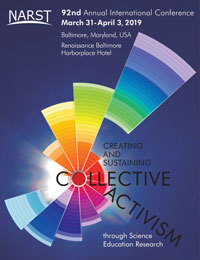|
PhD student David Liu is presenting at the 2019 National Association of Research in Science Teaching (NARST) Annual Conference in Baltimore, March 31-April 3.
NARST, since its inception in 1928, has promoted research in science education and the communication of knowledge generated by the research by encouraging and supporting the application of diverse research methods and theoretical perspectives from multiple disciplines to the investigation of teaching and learning in science; communicating science education research findings to researchers, practitioners, and policy makers; and cooperating with other educational and scientific societies to influence educational policies. The title of David’s poster presentation is “Gender Differences of Latinx 5th Grade Students and their Recognition of STEM Accomplishments.” Abstract: Despite many years of educational research and innovative pedagogy, the underrepresentation of Latinas in science and engineering is still a trend. Drawing from the literature on recognition work, this study looks at how to quantitively understand how recognition work may support future STEM career and trajectories for Latinas. The purpose of this study is to understand the impact of recognizing the achievements of 5thgrade Latinx students and how this impacts their future STEM trajectories and careers. Using t-tests and multiple regression, we see a sharp decline of interest in STEM careers from the beginning of 5th grade to the end of 5th grade for Latinas as noted in the literature. However, the analysis indicates that recognition work is highly predictive of future STEM career trajectories for Latinas and can in turn reverse the sharp decline of interest in STEM careers. Though there are very few studies that quantitatively try and measure recognition work, this study further supports the importance of recognition work. The study’s implications highlights the importance of recognition across time and advocates for the use of a survey by educators to have a snapshot of their students’ recognition and their STEM trajectories. Comments are closed.
|
Resources for:
|
|


